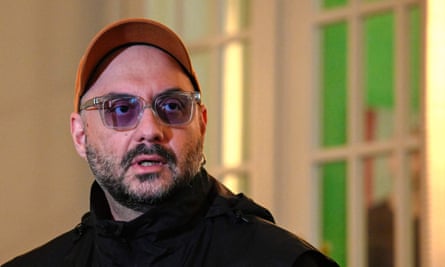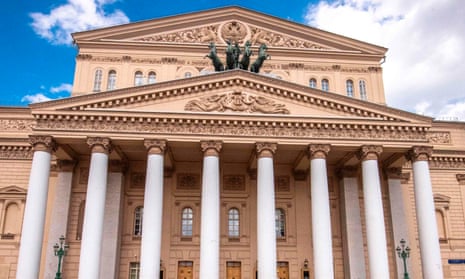Russia’s Bolshoi theatre has upset opera and ballet fans by abruptly cancelling shows this week by directors who have spoken out against the war in Ukraine.
The theatre gave no reason for dropping Timofey Kulyabin’s production of the opera Don Pasquale and Kirill Serebrennikov’s ballet Nureyev, which will be replaced by productions of Rossini’s The Barber of Seville and Aram Khachaturian’s ballet Spartacus.
Serebrennikov, 52, was allowed in March to leave Russia, where he was found guilty in 2020 of embezzling funds at Moscow’s Gogol Centre theatre.
His supporters say the conviction was revenge for his criticism of authoritarianism and homophobia under the country’s president, Vladimir Putin.
Serebrennikov said he was not surprised by the Bolshoi’s cancellation of Nureyev, which is based on the life of the Russian ballet superstar Rudolf Nureyev, who defected to the west in 1961. The work, which includes a tender scene with his gay lover that tested the Kremlin’s stance towards what it calls “homosexual propaganda”, has caused outrage among Russian conservatives.
“This ballet is about man’s yearning for freedom. Freedom to create and freedom to live,” Serebrennikov told Agence France-Presse.
“These days Nureyev is inappropriate and impossible on the Bolshoi stage. They are afraid of unnecessary associations and uncomfortable artists,” Serebrennikov added.
He called the cancellation a throwback to the Soviet era. “Nureyev was cancelled at the Bolshoi theatre. Cancellation of Russian culture in Europe, you say? In Russia, they themselves are cancelling culture.”

Kulyabin, who has also left Russia, used his Instagram account to express solidarity with Ukraine and ridicule Russia’s description of its actions there.
In one post, he showed a mocked-up version of the cover of Leo Tolstoy’s War and Peace, replacing the first word of the title with “Special Operation”, the term the Kremlin has used to describe the invasion.
“It’s quite obvious that Russia started the war,” Serebrennikov told France 24 in an interview last month and said it was breaking his heart.
“It’s war, it’s killing people, it’s the worst thing [that] ever might happen with civilisation, with mankind ... It’s a humanitarian catastrophe, it’s rivers of blood,” he said.
The Bolshoi performed Spartacus in early April, saying that proceeds would be used to help the families of Russian troops who died in Ukraine.
The cancellation of the two shows drew hundreds of mostly critical online comments from ticket holders. Many demanded in vain to know the reason.
“What disrespect to the spectators and artists!” one woman, Valeria, wrote on the Bolshoi’s Telegram channel.
Several dancers have in recent weeks quit the Bolshoi, including the prima ballerina Olga Smirnova.
